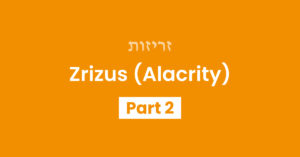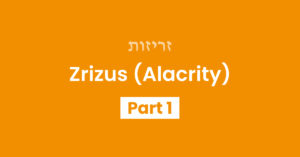If you look closely at the history and halachos of Pesach, you’ll see there is a clear running theme (excuse the pun!) of zrizus. Many things happened quickly or early. For example:
(1) We bake matzos very quickly to remember how Hashem took us out of Egypt so quickly that our dough didn’t even have time to rise.1
(2) Although the Jewish people were supposed to be in Egypt for 400 years2, Hashem recalculated the years and took us out earlier – after only 210 years.
(3) When the Jews left Egypt, they were required to eat the Korban Pesach quickly and prepared for immediate travel, as the Torah writes, “So you shall eat it: with your belts on, your shoes on your feet, and your staff in your hands, and eat it quickly!”3
(4) The Sefer HaChinuch4 writes that one of the reasons why we eat the Korban Peach roasted instead of boiled is because roasting works faster than regular cooking.
(5) Rav Yonasan Eibishutz5 says that when the kohanim offered the Korban Pesach, they passed on the blood from one kohen to the next so quickly that it looked as if the spoons of blood were whizzing through the air like arrows.
What’s going on?
Why is so much of Pesach related to Zrizus?
Why is so much of Pesach related to Zrizus?
The Sifsei Chaim6 explains that being trapped in Egypt represents being trapped by the Yetzer Hara.
Hashem took us out of Egypt in a rush to teach us that whenever we are trapped by the yetzer hara, the only way to free ourselves is by using zrizus.
Hashem took us out of Egypt in a rush to teach us that whenever we are trapped by the yetzer hara, the only way to free ourselves is by using zrizus.
How can we use zrizus to save ourselves from the yetzer hara? There are 2 ways:
Method #1: Act Fast – Just Do It Now!
On the most basic level, zrizus means moving quickly.
The yetzer hara uses many techniques to distract us from doing mitzvos or to lure us into doing aveiros. He tries to convince us not to wake up in the morning, not to go daven, not to do chessed, or he tries to tempt us with aveiros like eating things we shouldn’t eat, saying things we shouldn’t say, or looking at things we shouldnt see.
The trick to defeating the yetzer hara is to ACT quickly! Just do it! Don’t engage the yetzer hara in a discussion, trying to figure out whether you have the energy to do the mitzvah or not. Just get up and do it! No questions asked.
ACT quickly!
And on the flip side, when it comes to avoiding aveiros – don’t hem and haw trying to find a loophole why something might be permitted. Just don’t do it! Don’t debate if it’s really lashon hara or not, if the unusual kashrus symbol is reliable or not… Just don’t eat it! Just don’t say it! When in doubt, do without. And then quickly move on. The longer we wait around with the yetzer hara, the more likely we will fall into his trap.
The longer we wait around with the yetzer hara, the more likely we will fall into his trap.
This technique was used by Yosef HaTzaddik when Potifar’s wife tried to convince him to sin. Yosef could have thought, “I’m a tzaddik, I’m so strong! She will never be able to convince me to sin!” But no. Yosef knew the yetzer hara is very powerful, so he did not want to give even the tiniest opening to the yetzer hara. So what did he do? “VaYanas VaYeitzei HaChutzah”7 – he immediately fled outside. Yosef knew that the key to saving yourself from the yetzer hara is touse zrizus to immediately remove yourself from the aveira-prone situation.
Method #2: Plan Ahead
There is a second way we can use zrizus to avoid the yetzer hara: Although zrizus is usually defined as acting quickly, Rabbeinu Yonah8 defines zrizus as “Lir’os Es HaNolad – looking ahead and realizing the consequences of our actions.”
How do these 2 definitions of zrizus fit together?
What does “thinking ahead” have to do with “acting quickly”?
When it comes to fulfilling positive commandments, the Sifsei Chaim9 explains that a person who understands his human earthy, lazy, heavy nature will look into the future and realize that if he doesn’t push himself do the mitzvah now – to daven mincha now, to say a brachah acharonah now – then his lazy nature will likely overcome him, and he’ll miss the opportunity to do the mitzvah forever! Zrizus (looking ahead) is what causes him to do the mitzvah quickly.
On the flip side, when it comes to avoiding aveiros, a person must use zrizus to look ahead and prepare himself so as to avoid falling into the traps of the yetzer hara.
A person must use zrizus to look ahead and prepare himself so as to avoid falling into the traps of the yetzer hara.
If you know a conversation is leaning toward lashon hara, don’t wait until it’s too late – end the conversation now or change the topic immediately. If you know the plate of cookies is staring at you in the face every time you walk into the kitchen, don’t wait until it’s too late! – move them out of sight now, otherwise you’ll inevitably be tempted to eat them later. If you know you’re likely to encounter a situation where you wont know the right thing to do, learn the halachos now (as we explained last week) – don’t wait until its too late!
Hashem took us out of Egypt in a rush – and commanded us to eat the korban Pesach in a hurry – to teach us that the only way to avoid the trap of the yetzer hara is with zrizus – by acting quickly and thinking ahead.
The only way to avoid the trap of the yetzer hara is with zrizus – by acting quickly and thinking ahead.
Sources: [1] Devarim 16:3; [2] Bereishis 15:13; [3] Shemos 12:11; [4] Sefer HaChinuch Mitzvah #7; [5] Quoted in Sifsei Chaim, Middos V’Avodas Hashem Vol. II. pg. 390; [6] ibid. pg. 391; [7] Bereishis 39:12; [8] Rabbeinu Yonah on Mishlei 22:29, as quoted in Sifsei Chaim Middos V’Avodas Hashem, Vol. II. pg. 325; [9] ibid. pg. 327-328
Your Challenge
Once a day, use Zrizus to avoid falling into the traps of the yetzer hara.
Either (Method 1) when you feel tempted to sin, leave the situation immediately like Yosef HaTzaddik did. Or (Method 2) think ahead to realize in advance when you are likely to encounter an aveira in the future. Take precautionary measures now to protect yourself from falling into the yetzer hara’s trap in the future.
FOR EXAMPLE:
- If you feel tempted to eat something you shouldn’t be eating, immediately throw out the food or move it out of sight.
- If you feel tempted to say lashon hara (even potential lashon hara) or something negative, change the topic immediately so you wont be tempted to say it.
- Write a to-do list now for tomorrow – or get something done in advance like packing your lunch early – so that you’ll be in less of a rush tomorrow and therefore less likely to make mistakes as you rush through your day.
- If you hurt someone, apologize to them immediately so as to avoid getting stuck in a bad relationship with them later.
- If you are in a bad mood or thinking negative thoughts, redirect your thoughts immediately and think more positive thoughts instead. This will prevent you from spreading your negative mood to others.
Torah Questions
- About whom does it say: “Vayaratz likrasam – He RAN to greet them” (Bereishis 18:2)?
- Who was he running to greet?
- When Moshe was on his way to Egypt, he delayed doing a certain mitzvah, so Hashem sent a snake to attack him. Which mitzvah did Moshe delay? (See Shemos 4:24)
- Tehillim 34:15 says there is something that we should “chase after” and pursue. What should we chase after?
- Even though man was created from the earth and naturally feels heavy and lazy, there is a passuk in Sefer Iyov (Chapter 5) which says that man was created to work hard. What are the Hebrew words of the passuk?
- Which of the 12 Shevatim is compared to a deer that runs quickly? (See Bereishis 49:21)
- When did the ancestor of that Shevet run quickly? Where was he going? (See Sotah 13a)
- It says in Mishlei (26:13) that when a lazy person needs to get up and leave his house, he refuses to leave, and makes up excuses why he can’t go. What does the lazy person say?
Questions to Ponder
- The Mesilas Yesharim writes that the more a person is engrossed in experiencing the physical pleasures of this world, the harder it will be for him to act with zrizus. Why is this the case?
- Why did Shlomo HaMelech choose the ant to be our role model for zrizus, as it says in Mishlei 6:6? Why didn’t Shlomo tell us to learn zrizus from a different animal, such as the cheetah that runs very fast?
- The Orchos Tzaddikim writes that zrizus is related to single-minded focus; When a person clears his mind of all other thoughts and focuses only on doing Hashem’s will, that is what enables him to do mitzvos with zrizus. Can you remember a time when you were so focused on doing something that you were able to do it much quicker than usual?
- The Orchos Tzaddikim writes that when someone acts with zrizus, it proves that he loves Hashem. Why?




